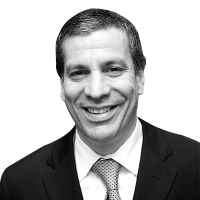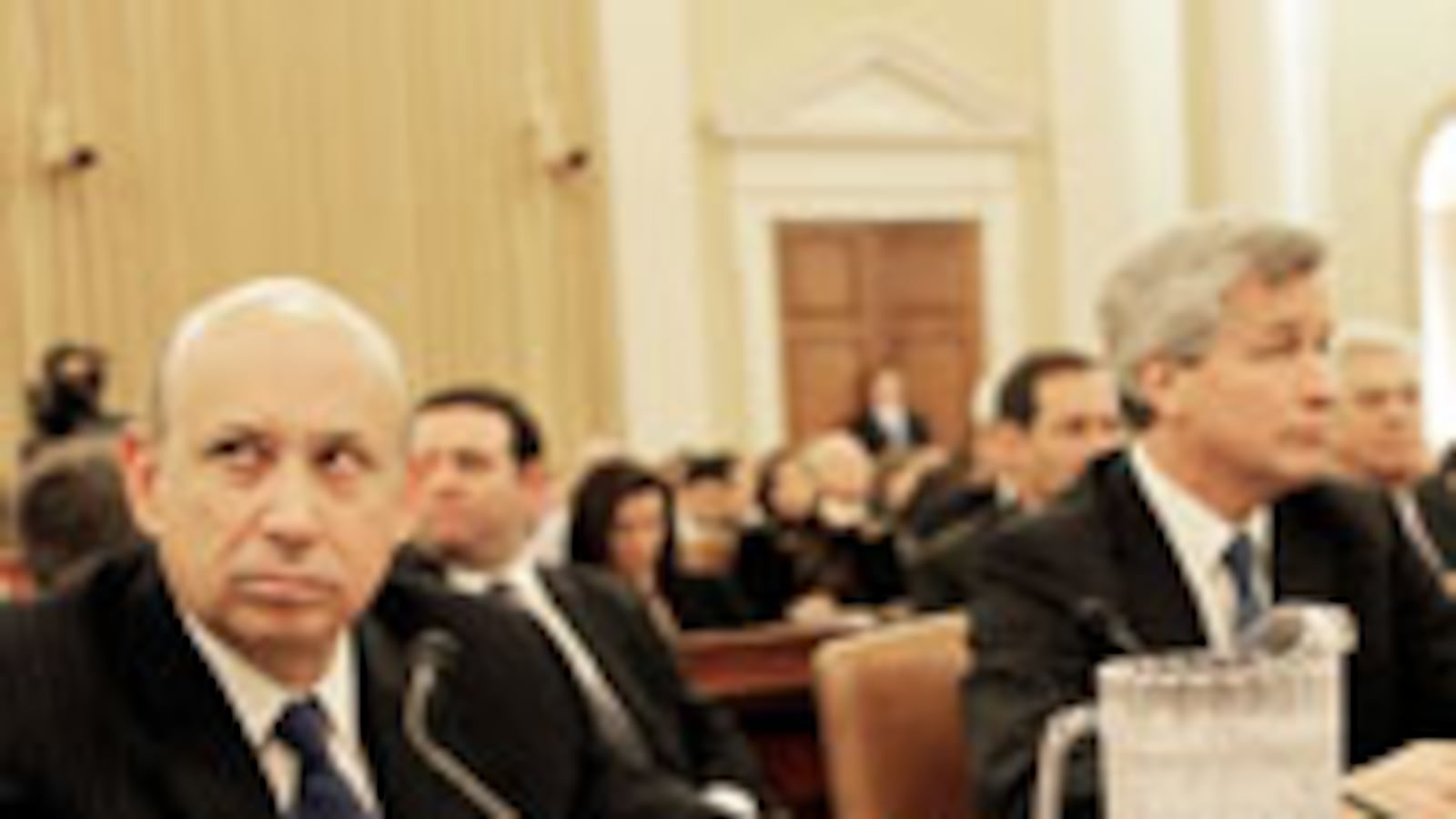
Wall Street is scared, and it has nothing to do with the investigation by the Financial Crisis Inquiry Commission, the congressionally mandated committee led by former California State Treasurer Phil Angelides that is looking into the root causes of the 2008 financial meltdown. At the committee’s first hearing last week, after the CEOs of Goldman Sachs, JPMorgan Chase, Morgan Stanley, and Bank of America were forced to swear they wouldn’t lie, I heard one of the committee members admit the probing questions he would be sending the heads of these firms would not be from his staff of crack investigators but from The New York Times.
The reality is that Wall Street couldn’t care less about what the commission comes up with about its past practices in mid-December, when it’s supposed to produce a report, largely because so much of it is well-known. A myriad of books have been written on the causes of the meltdown, including my own, and most have chronicled the greed and arrogance of Wall Street and how lax regulation and a proclivity to bail out the risk-takers over the past three decades through easy money and other mechanisms aided and abetted the mindless risk-taking in the first place.
The least appealing CEO on Wall Street is leading the effort to change the public perception that the system is rigged against the little guy suffering through 10 percent unemployment while the big banks party on.
No, what has Wall Street worried, at least according to the senior officials I spoke with in the days following the hearings, is not the past but the future. Wall Street sees no end to the massive public anger directed its way. (It’s why the president’s new banking tax seems to have little opposition, even among Republicans, who generally oppose higher taxes on anyone.) No matter how many times they say they’re sorry for taking all that risk and leading the country into the Great Recession, which destroyed the banking system and led to 10 percent unemployment, Americans can’t seem to forgive them.
Two big reasons why Wall Street sees no end to its low public standing is its difficulty in spinning the billions of dollars it’s handing out in bonus money just a year after being bailed out by the taxpayers, and Wall Street is increasingly being defined by one firm, Goldman Sachs, and its least capable spokesman, CEO Lloyd Blankfein.
If the hearings proved one thing, it’s just how much of a liability Goldman and Blankfein are to Wall Street’s attempt to massage its rotten image as an organization that feasts off government subsidies while Main Street suffers. Goldman is making bundles of money, which will make its shareholders happy. But it’s also emerged as a lightning rod because of its obvious manifold ties to government (former Treasury Secretary Hank Paulson, also a former Goldman CEO, gave his old firm $10 billion during the height of the meltdown, but let Lehman Brothers fry) and because Blankfein has spent most of the past six months on a high-profile charm offensive, clumsily trying to explain how his firm deserves to hand out the $20 billion in bonus money it accumulated since the 2008 bailout.
In the old days, anti-Goldman public opinion wouldn’t matter, but now it does. The firm loves to shape policy, and being the most hated player in the financial world—and having your CEO tell a newspaper he’s doing “God’s work” by simply trading bonds—makes it difficult for Goldman to play a role in the public-policy debates, particularly those that affect Wall Street, such as the new bank tax. Then there’s the issue of making money. Goldman can trade better than everyone else—hence its enormous profit margins—but will corporate America hire Goldman as its adviser on mergers and acquisitions if it’s the constant target of scorn and ridicule?
One way the firm is trying to reverse public opinion is by arguing, in a series of newspaper and magazine “exclusives,” that it really didn’t need all that bailout money in 2008, when the crap was hitting the fan and its stock was in free fall. Blankfein repeated this absurd rationale once again during the hearings, in response to a question posed by Angelides about the firm’s exposure to insurance giant AIG.
Blankfein explained that Goldman had indeed bought insurance coverage on its investments in toxic securities from AIG, but it also had been hoarding more than enough cash in preparation for the insurance giant’s demise and the probability that it would have to take losses on those holdings because AIG didn’t have enough money to cover their declining value.
But when pressed, Blankfein conceded that the same firm that hoarded all this cash, that had all these hedges and guarantees to protect itself from AIG failing, didn’t think twice about taking its full share of the money AIG owed it—100 cents on the dollar—once Paulson & Co. decided to bail out the insurer on the U.S. taxpayer’s dime.
This is why people hate Wall Street, and why increasingly, Wall Street isn’t too crazy about Blankfein. Back at Goldman, senior executives are growing increasingly agitated by the CEO’s inability to reverse public opinion, as well as his poor performance during the hearings. I am told that many senior executives want a better public face, someone in the image of its former chairman, the stately John Whitehead, who retired from the firm in 1984 and went on to serve in government.
That doesn’t mean Blankfein is about to get fired, but the first chinks in his armor have been made. There is a growing realization inside Goldman that Blankfein may be a good CEO—he was smart enough to hedge the firm’s bets on toxic mortgage bonds by shorting the real-estate debt back in 2007, even as he sold those securities to investors, meaning the firm (as it screwed its customers) made a few bucks to cover its losses—but he can’t seem to make the sale that he and the executives inside his firm are really good guys, no matter how hard he’s been trying of late.
My bet: If Goldman’s image doesn’t turn around fast, look for Blankfein to relinquish the role of chairman to someone more media-savvy, a move that couldn’t come fast enough for his counterparts at the other big firms. Seeing the body language of Jamie Dimon of JPMorgan and John Mack of Morgan Stanley during the hearings proved that their nightmare scenario is a reality: The least-appealing CEO on Wall Street is leading the effort to change the public perception that the system is rigged against the little guy suffering through 10 percent unemployment while the big banks party on.
My sources at these firms tell me they’re all aware of the obvious: The news clips, the stories, the TV segments about the hearings all focused on Blankfein’s absurd AIG defense or his explanation of how it’s OK to screw your customers because they’re “professional investors.” How about Dimon’s reasonable suggestion that banks should be able to fail, as long as they don’t flush the entire system down with them, or Mack’s mea culpa that Wall Street risk-taking was at the heart of the financial crisis?
Those statements were drowned out by Blankfein’s defense of the indefensible. Goldman may have been the best of a bad lot, as Blankfein said, but that’s like saying it’s great to be the tallest midget in the room.
Charles Gasparino is CNBC's on-air editor and appears as a daily member of CNBC's ensemble. He is a columnist for The Daily Beast and a frequent contributor to the New York Post, Forbes, and other publications. His new book about the financial crisis, The Sellout , was published by HarperBusiness.






